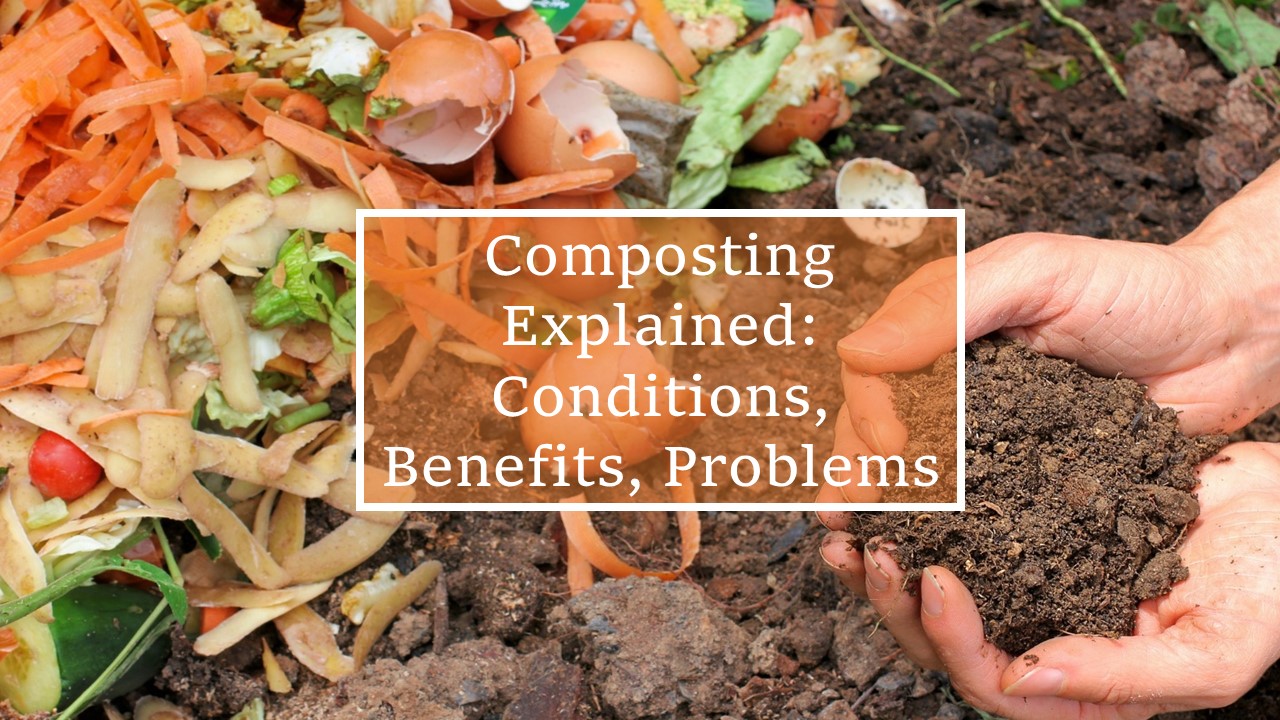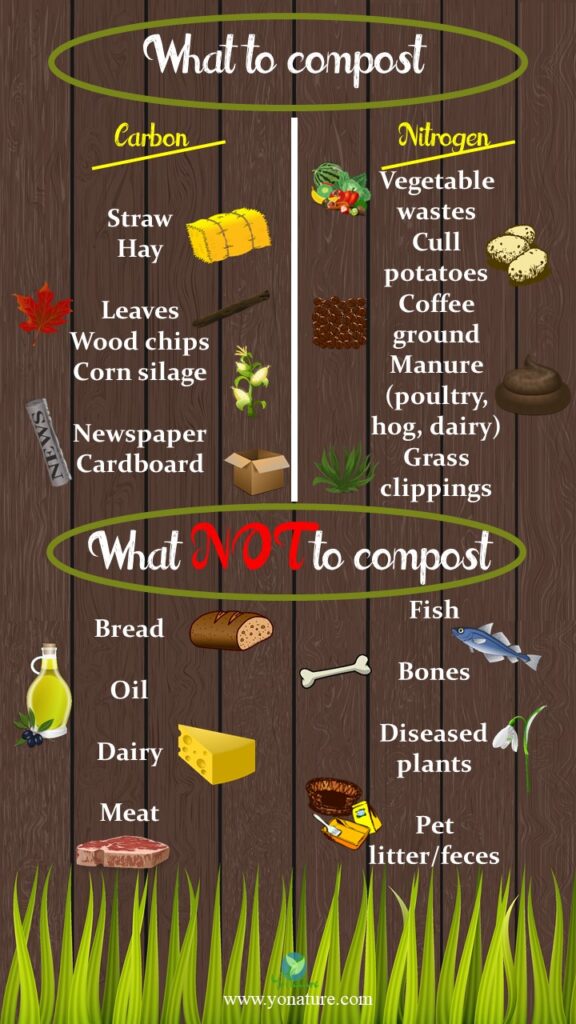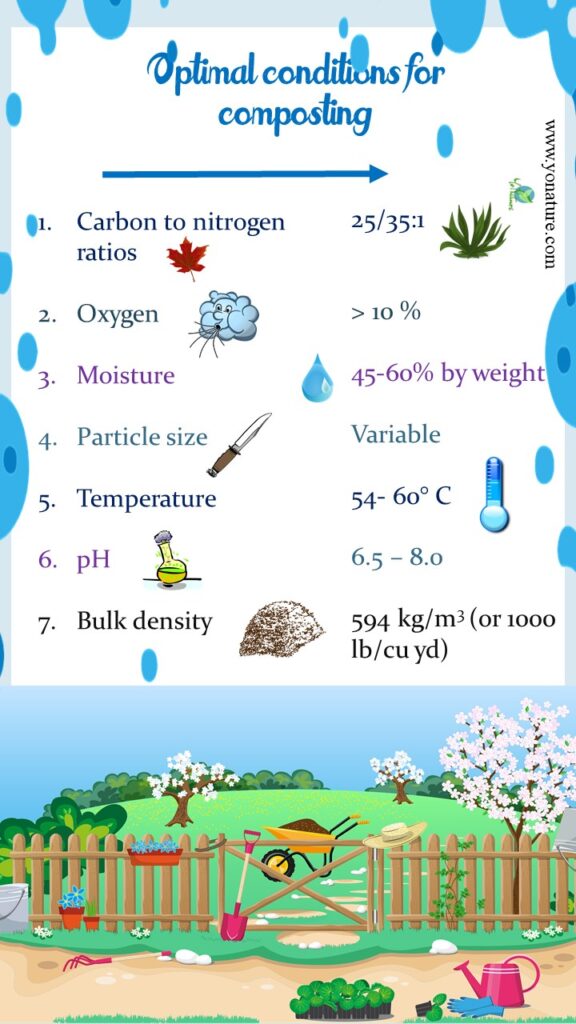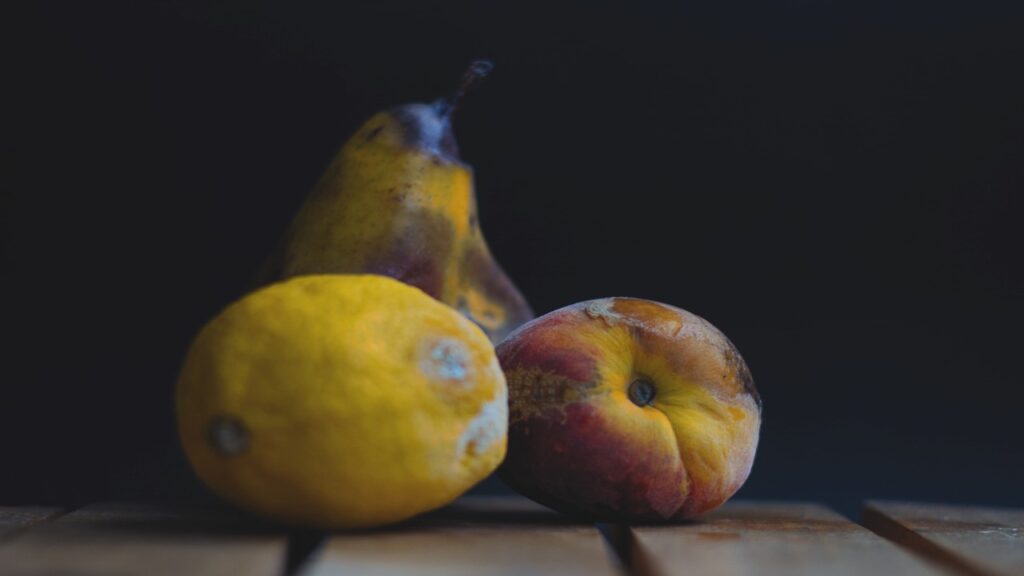Composting Explained: Conditions, Benefits, Problems

Composting is when we produce compost from common household wastes. Compost itself is a pile of nutrients that forms when these substances decompose. We then use it to enrich soils for plants to grow healthily.
What is composting?
Composting is actually the controlled breakdown of organic materials. Organic materials here refer mainly to kitchen and garden waste. It includes vegetable peels, eggshells, fruit scraps, grass, dry leaves, wood chips etc. Additionally, you can use poultry and hog manure but not pets’ waste.

Composting thus turns these wastes into biologically stable substances that enrich the soil.
In reality, composting is nothing new. Our ancestors used to turn their food waste into soil food. George Washington, the first President of the United States, was the first recognized composter in America. He noticed how farming was degrading the soil quality and built a dung repository to make compost to enrich the soil.
How to make compost
So, to begin, you must find a dry place in your garden to pile your waste. Make sure that rodents don’t roam around and rainwater does not get in. You can dig a hole in your garden to place the wastes and cover it well. Or you can use specialized composting bins.
You need four things to make a good compost: carbon, nitrogen, oxygen and water.
1. Carbon
Carbon basically comes from dry leaves, branches, wood chips and other garden wastes. It provides a source of energy for microorganisms to work.
2. Nitrogen
Here, it is mainly kitchen scraps like peels, fruits and vegetables that add nitrogen to the pile. Nitrogen helps microorganisms to make their new cells and multiply.
3. Oxygen
In general, composting can occur both with and without oxygen. But when oxygen is missing, it usually takes longer to compost. So every now and then, you have to turn or aerate your compost pile.
4. Water
Moisture is important when it comes to composting. But the right amount of water is essential. In general, it should feel moist when you touch the pile.
If there is too little water, the temperature of the pile will rise and drop quickly. Too much water conversely will decrease air space and lead to anaerobic conditions.
Optimal (Best) conditions for composting
So, as a general rule of thumb, the best conditions for composting are
- Carbon to nitrogen ratios: 25/35:1
- Oxygen: > 10 %
- Moisture: 45-60% by weight
- Particle size: variable
- Temperature: 54- 60° C
- pH: 6.5 – 8.0
- Bulk density: 594 kg/m3 (or 1000 lb/cu yd)

What happens during composting?
So, at home, it is typically microorganisms that live in the soil that create the compost. Creatures like earthworms, mites, ants and beetles start to crush the rough particles into smaller bits and pieces.
In factories though, it is composters that break the compost materials.
Once, the best conditions are reached, bacteria, fungi and protozoa continue the decomposition.
Process of composting
The temperature rises rapidly within 24 to 72 hours and remains as such for several weeks. This high temperature kills pathogens, weed seeds and toxic compounds. This is why it is important to aerate the pile here as it helps the microorganisms to work more effectively.
The temperature eventually drops and the compost begins to mature. The rate of oxygen eventually declines to the point that you no longer have to turn it.
Immature compost
This mature phase can be long or short depending on the efficiency of the process. If you did not add enough air or there’s too much moisture, the compost will be immature. That is, it may contain high carbon to nitrogen ratios, too much acids or too much salt. And if you add this immature compost to your plants, it can kill or damage them.
How long does it take to make compost?
In general, there is no specific time to know when your compost is ready. The length of the process principally depends on the feedstock that you use and the conditions that prevail. A small pile will decompose faster than a large pile.
So, if you are composting at home, it typically takes around six to twelve months. But it can be as short as four weeks to as long as two years.
How do you know when your compost is ready?
Now, when no more decomposition takes place, you know your compost is ready. But it might be difficult to assess that.
So, instead, you can measure if the conditions within the pile are back to normal. Typically, when the compost is ready, the temperature in the middle of the pile is the same as the surrounding temperature. Oxygen levels as well remain greater than 10-15% over a few days.
And the final product will typically look dark brown and have an earth-like feel to it.
Benefits of composting
Whether you are doing it at home or commercially, composting has several benefits. It saves you money and resources, gives you rich nutrients for your plants and reduces your ecological footprint.
It also has a number of environmental advantages.
1. Composting reduces the amount of waste
The FAO reports that we lose or waste one-third of food that we produce to consume [1]. Or 1.3 billion tonnes of food per year.
In fact, according to a report of the World Bank, 44% of our waste stream is food and green.
In many countries, there is a lack of means to dispose of waste. For instance, North Africa, the Middle East and South Asia openly dump their waste. Thus composting helps to significantly reduce the waste that we produce.

2. Decreases pollution
When organic waste goes into landfills or we dump them in open areas, they decompose. As a result, they release toxic products due to low temperatures and/or high moisture contents. This may lead to long-term pollution such as
- Groundwater pollution when materials seep into the soil,
- Release of the potent greenhouse gas, methane, which contributes to climate change and
- Odour pollution which can harass adjacent communities.
Hence, composting helps to considerably decrease these issues.
3. Composting improves soil quality
One of the most important benefits of composting is that it improves the quality of the soil. When soils lose their fertility, harvests can decrease and crops become susceptible to disease and pest.
As compost is basically a mix of nutrients and organic matter, it increases the fertility of the soil. It improves the ability of the soil to hold water and maintains a good tilth. In this way, it provides better aeration for seeds to germinate and grow.
Using compost thus reduces the need for fertilizer which often contains many chemicals. It is a good organic fertilizer by itself that increases the potential for organic food production.
4. Eco-friendly technique to manage waste
Composting is an eco-friendly way to manage organic waste such as manure.
As it is, farm animals produce a large amount of waste. Sometimes, owners dispose of this waste in rivers as they cannot transport it to treatment areas.
For example, in the European Union, poultry farms produce 13 million tons of manure every year. So, composting helps to manage this waste as well as decrease the health hazards that it could cause.
5. Kills weeds, pathogens and breaks toxic compounds
Basically, during the composting process, weeds and pathogens die.
At the same time, harmful chemicals that are in manure compost also decompose. For example, 75% of the antibiotics that we feed poultry go into their wastes. If we do not treat these excrements, they can be harmful to the environment, other organisms and humans.
Composting helps to break down these toxic compounds effectively.
Disadvantages of composting
1. Composting is smelly
As the composting process requires the waste to decompose, it is smelly. The composting pile in fact releases gases like methane, nitrous oxide and carbon dioxide.
Sometimes, when there are too many nitrogen products, it also gives off ammonia. Consequently, you or your neighbours may not appreciate the smell.
2. Composting takes time
Without a doubt, composting is a lengthy process. Depending on your compost pile and conditions, you might get your results in at least four weeks. In general, it is even longer.
3. Equipment cost
Now, if you are composting at home on a small scale, you can do it somewhere in your garden. You can use trash cans or wood pallet bins to do it.
But on a large scale, you will need heavy equipment to process the materials and transport the compost.
4. Assessing the maturity of compost
Assessing the maturity of your compost is a very critical step. Especially if you’re in a hurry to use it. You must be sure that your compost is indeed mature before you add it to plants. Else it might damage them.
It is not enough to count the days to assess whether your compost is ready or not. The conditions within the pile must return back to normal for it to be effective.
Uses of compost
1. Soil conditioner
The most common use of compost is in fact to condition soils in the agricultural sector.
2. Top dressing lawns/grass
You can also sprinkle a thin layer on lawns and grass patches. It will help improve the soil structure and the overall beauty of your lawn.
3. Growing media
Compost is also good as a soil-less media to grow plants. It is better than the one that we commonly use, peat, which is a non-renewable material.
4. Manufacture top soil and sub soils
5. Manufacture mulch
6. Immature compost
You can use immature compost to amend soils. But you must add it several months before you actually plant. You can also use it to ameliorate poor quality soils or to cover landfills.
Reference
- Gustavsson, J., Cederberg, C., Sonesson, U., van Otterdijk, R., Meybeck, A., 2011. Global Food Losses and Food Waste: Extent, Causes and Prevention. FAO, Rome.

Pingback: Droughts Explained: Types, Causes and Examples - Yo Nature
Pingback: Green Living: 10 Best Ways to Live a Green Life - Yo Nature
Pingback: 10 best easy-to-grow plants for new gardeners - Yo Nature
Pingback: Effects of wildfires: Positive, Negative, Examples - Yo Nature